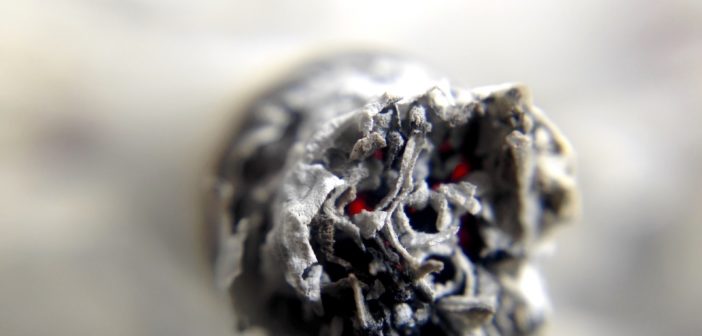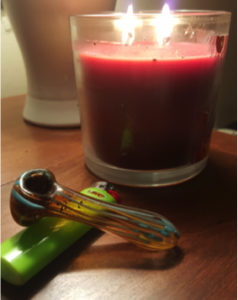EDITOR’S NOTE: All names have been changed to protect the identity of the sources.
As she does at 7:32 most mornings, Alexis is packing a bowl.
“It helps me sleep, helps me eat, helps me wake up. It helps with everything,” she says, thin fingers pressing ground bud into an intricately designed yellow and orange bowl. After it is prepared, she lights up with a lime green Bic lighter and inhales deeply, the bowl glowing in the morning light that sprinkles through her screened window. She blows the smoke through the screen, but the scent of weed lingers in the room.
“Oh s***,” she says lazily, getting up from her bed. She uses the same lime green lighter to light the candle on top of her dresser. Autumn Day. As the wax melts down, it mixes with the smell of marijuana, attempting to mask its strong aroma. Marijuana on an autumn day — a signature fragrance.
Alexis must cover the traces of her smoking because in Illinois, cannabis is still outlawed for recreational use. Although she’ll balk at a person’s use of the term recreational when referring to her cannabis habits.
“For me, it’s not about getting high or f***** up at a party on the weekends. I don’t use it just for that,” she explains around a hit of her bowl, lovingly dubbed Simba due to its colors. “I’ve had anxiety for years and every medication I went on turned me into a zombie or didn’t work. I’m not saying I’m a professional in this stuff, but it is what helps while keeping me … me.”
Alexis’s self-diagnosis is one that many people could probably relate to. Although not the most perfect option, it is all that she, as a college student, has found is effective. What would be ideal is her getting a medical marijuana card so that she could utilize the specific strains proven to help with anxiety. But she’ll take what she can get.
“I usually get good stuff from the guy I buy from. But some is better than others, it’s hit or miss,” she explains. “I’ve thought about ordering the certain kinds, but I’m afraid it’ll get picked up.”
The shaking in her hands that has plagued her most of her teenage and adult life subsides after a few hits from Simba. She fries an egg with a steady hand, pours a cup of orange juice without a tremble. At night, it helps quiet her mind, a mind she says “feels like it’s trying to solve a puzzle that doesn’t even have the right pieces. Like someone took half of them and swapped them with another puzzle and I’m still trying to think of ways it will work. It’s just, it’s impossible.”
But now, she is calm. Collected. Ready to tackle class and a job without racing thoughts to distract her. Even when the immediate effects wear off, she is more relaxed than usual. She admits, if she smokes too much it almost reverses the effects – she becomes paranoid and edgier than she is normally. But now, she is careful and knows when she has to turn to herself to calm the anxiety within instead of weed.
Some would take Alexis as an example of why weed would be dangerous if legalized recreationally. If she uses it daily and then drives, is it impairing her judgment while operating the car? Could she cause an accident just as alcohol does? Is she just as much an endangerment as a drunk driver?
“They’re both damaging, both put you under the influence. It’s still dangerous,” says Sarah a sophomore. Although she has not consumed marijuana, she believes it to be a liability to her health. Many people share in her opinion, especially based on the fact that long-term effects on the brain are not entirely clear.
The legalization of recreational weed in Colorado has brought up a lot of gray areas in the usage of weed and how it affects each person. Although there are laws in place to prevent stoned drivers, the system for determining if a drugged driver is too high to drive is still a work in process.
Despite the issue of driving drugged, which regular weed smokers report being easier than driving drunk, Colorado has benefitted financially and socially from the new legislation. The budding (no pun intended) industry brought in $135 million to the state and created jobs statewide. And the lack of focus on petty weed crimes from the police allows for a larger focus on violent crimes.
“Not only this country, but others would benefit too,” maintains Margaret, a senior who has consumed weed on occasion. “Since they legalized it in Colorado, drug traffickers have actually switched to growing tomatoes because it’s more profitable now. And it has stopped the stupid arrests of people who are high to make room for dangerous criminals.”
Dispensaries in Colorado are required to tag each plant with a radio frequency chip so that the state can track it from its early life to the sale, a precaution even more extreme than those regarding alcohol and tobacco. Additionally, all marijuana is tested for contaminants and must be sold in childproof containers, hypothetically reducing the chance of weed laced with other drugs and accidental ingestion by children.
With the few states in the U.S. that have legalized it recreationally still in the test phase, it may take time before the entire country on board with making marijuana mainstream. But in a time where weed has been smoked by 1 in 3 people, it might not be too long before it hits your local corner gas station.


